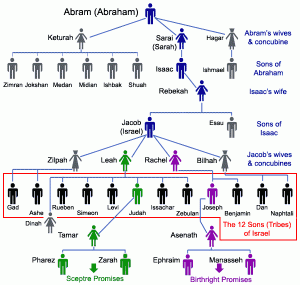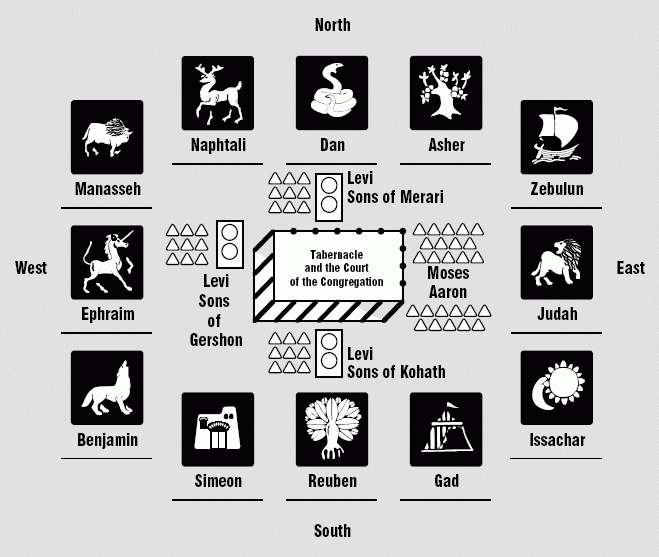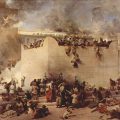Dear Gramps,
There are various references in the Bible to the lineage of Abraham–House of Israel, Family of Jacob, House of David, Israel, etc. Why is there not more consistency? It seems to me that there are distinctions, otherwise why the variety of terms? For example, the Lineage of Abraham would include Esau and his descendants–am I making this clear?
P.S. Thanks for the answer to the lost ten tribes. I’m looking forward to going over it in more detail.
Mary Jane (Erie, PA)
Dear Mary Jane,
Abraham was highly favored of the Lord and received from him a great promise, found in Abraham 2:9-11
And I will make of thee a great nation, and I will bless thee above measure, and make thy name great among all nations, and thou shalt be a blessing unto thy seed after thee, that in their hands they shall bear this ministry and Priesthood unto all nations;
And I will bless them through thy name; for as many as receive this Gospel shall be called after thy name, and shall be accounted thy seed, and shall rise up and bless thee, as their father;
And I will bless them that bless thee, and curse them that curse thee; and in thee (that is, in thy Priesthood) and in thy seed (that is, thy Priesthood), for I give unto thee a promise that this right shall continue in thee, and in thy seed after thee (that is to say, the literal seed, or the seed of the body) shall all the families of the earth be blessed, even with the blessings of the Gospel, which are the blessings of salvation, even of life eternal.
Among the great blessings here promised to Abraham are three significant things to consider: 1) that the rights of the priesthood would be given to and administered through his descendants; 2) that whoever receives and obeys the gospel of Jesus Christ will be adopted into his lineage, receiving the rights of all the promised blessings; and 3) that through the administration of the priesthood by the descendants of Abraham shall all the nations of the earth be blessed.
At the death of Abraham the Lord reaffirmed this blessing on the head of his son, Isaac.
And it came to pass after the death of Abraham, that God blessed his son Isaac; and Isaac dwelt by the well Lahairoi (Genesis 25:11).
Isaac had two sons–Esau and Jacob. Although Esau was the older, and as such would normally receive the rights of the firstborn, nevertheless, through a deception instigated by his mother, Rebecca (Genesis 17:1-27), the father’s blessing was given to Jacob instead of to Esau.
Therefore God give thee of the dew of heaven, and the fatness of the earth, and plenty of corn and wine: Let people serve thee, and nations bow down to thee: be lord over thy brethren, and let thy mother’s sons bow down to thee: cursed [be] every one that curseth thee, and blessed [be] he that blesseth thee. (Genesis 27:28-29).
Jacob’s name was changed to Israel (Genesis 32:28). He, through his four wives, had twelve sons, whose descendants have come to be known as the twelve tribes of Israel. These twelve tribes are the heirs of the blessings of Abraham and the inheritors of the rights of the Holy Priesthood, and through them all the nations of the earth are being, and will yet be, blessed.
Now, as to the terminology used in the scriptures referring to these families and their lineage, we encounter both synonyms and homonyms. The seed of Abraham and the children of Abraham, are synonymous expressions for the descendants of Abraham. We have the house of Israel and the children of Israel as synonymous terms. And the term house in this sense is also synonymous with the word tribe. But the word house is a homonym with several meanings. Of course it refers to a dwelling, such as “the house of the Lord,” referring to the temple. It also refers to a family, as those that live in a house, or to an extended family which would include the relatives of the head of the house, as in 2 Samuel 3:1; “Now there was long war between the house of Saul and the house of David: but David waxed stronger and stronger, and the house of Saul waxed weaker and weaker.” So we have the words descendants, family, children, house and tribe, all used as synonyms relating to the covenant people of the Lord. Each of these synonymous terms is also used as homonyms in various applications in the scripture.
How are we to know which definition of each word was intended by the original author? There are a variety of interpretations of much of the scripture–witness the large number of different church denominations with their varied beliefs, who all take their different doctrines from the same bible. To understand the intent of the scriptural authors and the meaning of the scriptures, we cannot apply to an analysis of definition, etymology, sentence structure or word usage, because all will admit to various possibilities. There is, however, a sure and unequivocal method by which the true meaning of any scriptural passage may be determined. Paul tells us “for what man knoweth the things of a man, save the spirit of man which is in him? even so the things of God knoweth no man, but the Spirit of God” (1 Corinthians 2:11), and that “the natural man receiveth not the things of the Spirit of God: for they are foolishness unto him: neither can he know [them], because they are spiritually discerned” (1 Corinthians 2:14).
Thus, the scriptures, as they treat the things of the spirit and the things of eternity, can never be understood without the aid and inspiration of the Holy Spirit. Paul, who was a learned man in his day, did not rely on the power of his own intellect to understand the scriptures, Rather, he confesses, ” Now we have received, not the spirit of the world, but the spirit which is of God; that we might know the things that are freely given to us of God. Which things also we speak, not in the words which man’s wisdom teacheth, but which the Holy Ghost teacheth; comparing spiritual things with spiritual” (1 Corinthians 2:12-13). Those of us who have been baptized into the Church of Jesus Christ of Latter-day Saints have had bestowed upon us in an authoritative way the Gift of the Holy Ghost. To apply this gift to the understanding of scripture we must first live a life of sufficient worthiness that we may receive the gift that has been bestowed on us. (See Mosiah 2:37; Alma 7:21; Alma 34:36; Helaman 4:24) Then it is necessary to appeal to the Lord in prayer that he will reveal to us the meaning and intent of His word. “And it is my will that you shall humble yourselves before me, and obtain this blessing by your diligence and humility and the prayer of faith” (D&C 104:79). Then it is necessary to study, ponder, reflect, examine, compare, and do as much as is in our power to understand what we read. Associated with this activity we must listen to and be perceptive to “the still small voice”–the whisperings of the Holy Spirit– “And it came to pass when they heard this voice, and beheld that it was not a voice of thunder, neither was it a voice of a great tumultuous noise, but behold, it was a still voice of perfect mildness, as if it had been a whisper, and it did pierce even to the very soul” (Helaman 5:30). By diligent application of these principles in the frequent reading and study of the scriptures, we will come to understand by personal revelation from the Divine Source itself the meaning and intent of the word of God.
Gramps







